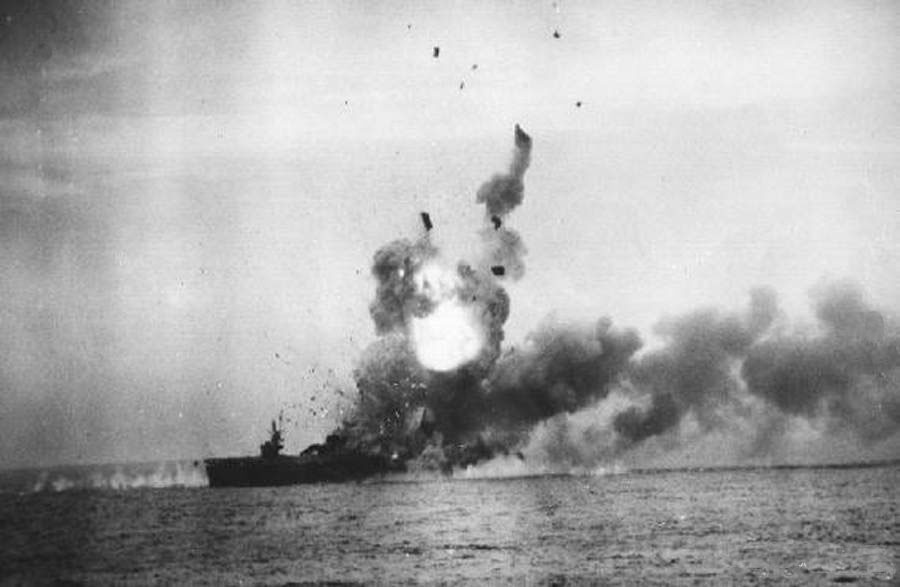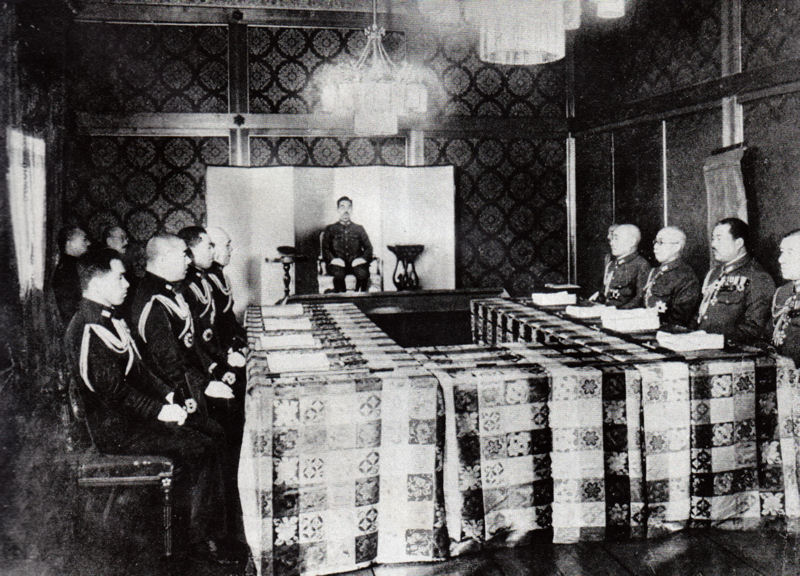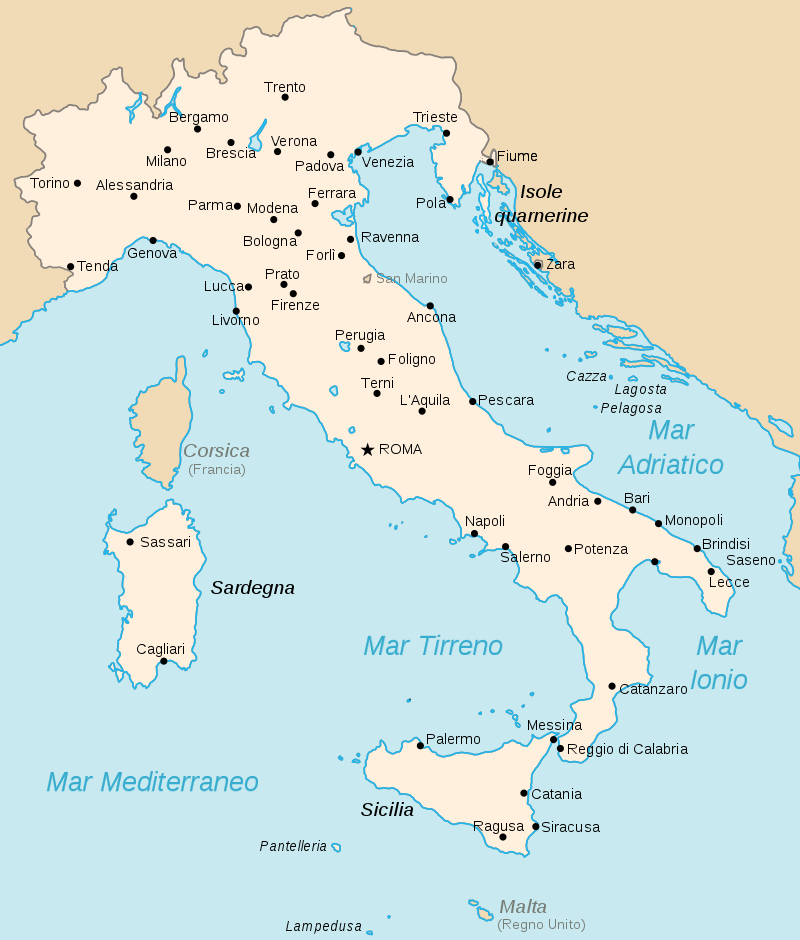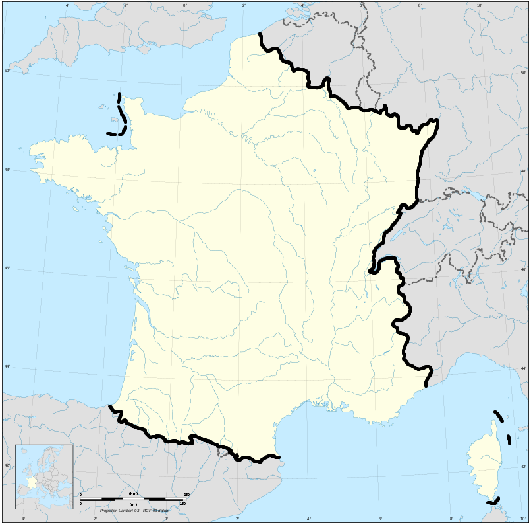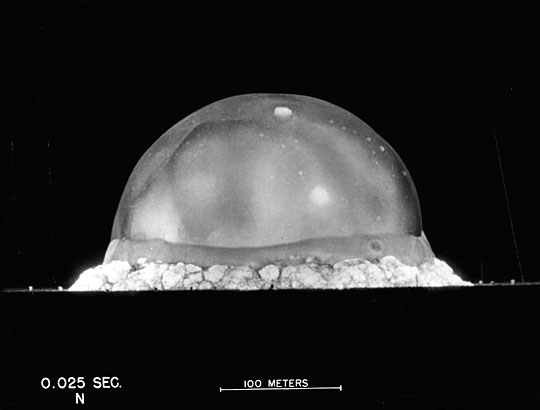"La France Continue" (LFC) a different destiny for France. (France continues to fight in 1940 by Emi
Nov 14, 2022 15:16:38 GMT
Post by lordroel on Nov 14, 2022 15:16:38 GMT
"In the interwar period, we failed to build a French Europe with our brothers in Central and Eastern Europe. They are for the moment lost to France. But for them too, one day, the dawn will come.
Gentlemen, let us try to succeed in uniting around us the European continent, the cradle of a civilization that the Nazis did not succeed in annihilating and of peoples that they could not enslave.
France, the French and the free peoples of Europe count on you.
Extract from the "Letter from Yalta" sent by Charles de Gaulle from the Crimea to Paris and read by Paul Reynaud to the members of the government.
Roosevelt's funeral procession, followed by a large crowd, including African Americans, made its way up the main streets of Washington, D.C. His body was then displayed at the White House for the public to view. Finally, the deceased president was laid to rest in the garden of his Springwood home in Hyde Park (now Franklin D. Roosevelt National Historic Site).
It was a great moment of national unity, a truce in the midst of an election campaign that would only be surpassed in anger by that of 1860, the one that led to Lincoln's election...
As soon as the tribute ceremonies were over, the fight resumed. Not only between Republicans and Democrats, but also within the latter. Truman, then a mere senator, had much more time than Wallace, head of state and warlord, to weave his web, supported in this by the Establishment as well. Finally, on October 9, a month before the election, the delegates decided to discard the incumbent president, despite his greater popularity, in favor of a Truman-Morgenthau ticket.
Truman's intention in naming a hardliner as his running mate was to show himself to be a wartime leader in line with Roosevelt. Indeed, Henry Morgenthau was the author of a secret plan to deindustrialize and dismember defeated Germany.
Truman and Morgenthau, having just been appointed, threw themselves wholeheartedly into the campaign. But two events swept away any chance they had in this election. Firstly, the triumphant (albeit difficult) American victory in the Gulf of Leyte and the destruction of the shreds of the Japanese fleet at the end of October boosted the image of the president, who appeared in the eyes of public opinion as a victim of the Democratic Party caciques. Secondly, the revelation of the famous Morgenthau Plan to the general public by the press, a plan that shocked American public opinion, which feared in reaction a renewal of the fighting spirit of the German army, which seemed to be on the verge of liquefying at that moment, with the relatively easy entry of the bulk of the allied forces into Germany at the end of October, which followed the victory at Aachen. Dewey was quick to use this fear.
"Your plan, Mr. Morgenthau, has offered the enemy a dangerous surge!" he accuses.
Demagogically, Dewey wanted to continue the New Deal, while declaring that he wanted to improve it by putting an end to the waste of money, in particular by reducing the administration, while the Republican Party, which was generally conservative, was opposed to this same New Deal...
This low-level campaign ended with the victory of the Republican camp and the Dewey-Bricker ticket.
Meanwhile, not only did the war continue, especially in the Pacific, where to the great distress of Higashikuni, the Japanese air force began, on the initiative of the officers present there, to launch suicide attacks against the American fleet in the Philippines. But Wallace was still president until January 20, 1945, and therefore led the negotiations for the imminent post-war period in Europe, where Budapest and Bratislava (and the Tiso government) fell in mid-November, where the armies of the Reich were driven back into the so-called Curonian Spit in Latvia (and the Baltic States experienced a second Soviet annexation) and finally the siege of Konigsberg began (in which the Poles participated) and the Red Army was stationed 80 KM from Berlin, on the Oder, following its offensive towards the Nazi capital. Finland signed an armistice at the end of September with the USSR on a basis that allowed it to keep the territories it controlled at the time of the signing, i.e. most of its 1938 territory, including Viipuri, the country's second largest city, due to its heroic resistance. Himmler, certainly too busy elsewhere (or already prepared to save himself), ordered his army to evacuate Lapland without violence (!). The fighting continued in Finnmark, in the extreme north of Norway.
The other 3 Great Ones were waiting for the conclusion of the American election to organize a major conference between the 4 main leaders of the Allied Coalition. It was held in Yalta, Crimea, from December 3 to 10, 1944. Wallace brings Dewey with him, while reminding him that he is still the "leader".
Stalin is ecstatic, the real miracle is for him and not for Himmler. To a Roosevelt arranging, succeeds a Stalinobéât at the right time! He knows that he will get from the American president all that he can get in Europe in exchange for vague promises about free elections and his support for the future UN, which Stalin begins to understand well the impact it will have on the future of the World. This will give him a free hand to implement his plan...
Faced with the two superpowers of the future, Churchill and de Gaulle form a block, but Stalin holds a "pledge" of importance towards the second...
The million and a half French prisoners held in Poland and eastern Germany!
He could delay their release, or even worse, if the General was too firm, especially with a Wallace who was completely blind to the Soviet.
But, the general offensive in Germany taking place under the best auspices, Churchill can set in motion an operation that while showing Stalin the determination of the great European powers, appears militarily credible and will not directly affect Soviet interests.
Operation Menace, whose name, by the way, is written in the same way and means the same thing in French and in English, while demonstrating the real discreet purpose of the attack...
An offensive on occupied Norway, in coordination with Sweden, which was preparing to break its neutrality (at a time when Turkey had finally done so, that is, just to join the future UN as an "allied power")! Indeed, the Himmler government was liquefying, most of the death camps had been liberated and the time no longer seemed to be ripe for diplomacy, the Swedish representative in Budapest, Raoul Wallenberg, who had obtained the liberation of many Hungarian Jews, having mysteriously disappeared after having been summoned by the Soviet authorities...
Supported by the French Navy and some battalions of the Corps-Francs, the operation was mainly British, however.
On December 6, while the Yalta Conference was in full swing, Sweden gave the German forces stationed in Norway 24 hours to surrender, failing which the army of King Gustav V would intervene to do so. Astonishment, the Europeans still have resources, especially since the case is finely played. Indeed, the Nazi forces in Norway, commanded by General Lothar Rendulic, responded favorably to the ultimatum and surrendered without fighting to the Swedes and the British.
As for those in Denmark, they did not undertake the slightest operation against neighboring Sweden, waiting for the final surrender of the Reich to throw away their weapons...
"Threat" shows the determination of the Franco-British to oppose as far as possible the extension of the Soviet Empire on the Old Continent. But it does little in itself against the Stalinist plans in Scandinavia. Indeed, Stalin did not intend to seize Norway. More annoying for the Red Tyrant was the frank rallying of Sweden to the Western camp, a Sweden that had already agreed to take in thousands of Baltic refugees fleeing the Red Army.
"Finally the House of Bernadotte washes the stain of the treason of 1813! In will say de Gaulle to de Courcel.
As a real response of the Soviet wolf to the West European shepherds, on December 9, following violent demonstrations by local communists supported by the Soviet occupation forces, which prevented the Romanian police from intervening while mercilessly repressing the monarchist and democratic counter-demonstrations, King Michael I was forced to appoint the communist Gheorghe Gheorghiu-Dej as Prime Minister. Note that Ana Pauker became deputy prime minister in this cabinet.
Despite the arbitrary arrest of the main figures of the former Maniu government (including the former prime minister himself), the king, now a man, decided to stay to protect his people as best he could from the Stalinists.
Churchill and de Gaulle (and also Dewey, despite his duty of reserve) protest as much as they can, but this does not prevent this subtle mixture of retaliation and "test" of Henry Wallace's determination from being a great success for Stalin. Indeed, the American president finds absolutely nothing to complain about, the demonstrations being for him (and the communists of the whole world) spontaneous! Moreover, in neighboring Hungary, largely liberated by the Red Army, the provisional government of the Hungarian Republic was led not by Communists, but by the Agrarians of the "Independent Civic Party of Smallholders and Agrarian Workers. Zoltán Tildy and Ferenc Nagy, both members of this party, were respectively head of state and prime minister. As for the Benes cabinet, did it not come directly from pre-war democratic Czechoslovakia?
Doesn't this show the goodwill of the Soviet?
In response to this goodwill, de Gaulle telegraphed Delestraint, who was in the middle of a mad dash across Bavaria (the French flag was flying over the eagle's nest in Berchtesgaden, which De Hauteclocque's second armored division had seized), the following order:
"Run to Vienna! The German army is finished, so don't worry about your flanks. You must get there first!"
Of course, Stalin will be immediately informed that the Vojd guests are tapped anyway, but it must be done quickly, while, moreover, that Stalin is immediately aware will, in fact, beneficial.
Indeed, there is almost no more combat in the West, only the management of the immense masses of German prisoners and the logistical difficulties delaying the advance of the Western armies from now on. For the Soviets, they must in this race to the former imperial capital of the Habsburgs still, on the contrary, fight the last Arrow Crosses and SS armored divisions (therefore still combative) that defend the region of Lake Balaton and its oilfields. The last oil resources of the Reich, but above all for these defenders, the gateway to Ostmark, the name given by the Nazis to the Gau formed by Austria following the Anschluss of 1938.
However, if de Gaulle ordered the French army to seize Vienna by forced march, in agreement with Churchill (and of course Wallace... ) announced to Stalin that it was up to the Red Army "which bears on its standards the names of its immense victories over the German invader, victories which at the cost of the death of tens of millions of Soviet citizens, have contributed to the annihilation of 80% of the Wehrmacht!" to have the honor of entering Berlin first and to strike the final blow to the Nazi regime.
More discreetly, the General sent his chief of staff and aide-de-camp, Geoffroy Chodron de Courcel, to deliver a secret message to the government, which had remained in Paris, where Paul Reynaud was acting as interim leader.
Here are the contents:
"Gentlemen of the government,
If honor obliges us to be the first to enter Berlin, the future obliges us to give it up.
In 1940, Weygand was ready to sacrifice France by pushing the government to a purely political armistice to save the honor of the army. It was to save our future that we went into exile!
If we take Berlin, not only will Stalin never forgive us, but Germany, cut off from its eastern provinces, will be entirely in the hands of the Western Allies and will become an obliged partner of the Western camp.
In order to face Stalin, we will be forced to accept in a short time, following the "friendly pressure" of our Anglo-Saxon partners, his rearmament.
This is contrary to our interests and therefore to our future.
Stalin in Berlin, Germany will be cut in two.
This situation is already more in line with France's interests.
In the worst case, we will have an even weaker Germany, made up of two rival entities.
At best, we will push it to neutrality in this "Quasi-war" (The expression "Cold War" not being invented yet, the General refers to the quasi-war of 1799 between revolutionary France and the young United States, a true undeclared war). It will be isolated and without an army.
France will then be at the head of the European powers because, as you have all understood, England will eventually turn its back on the continent to turn to the powerful America.
For these are her true interests.
As Mr. Jaspar (named after the Belgian minister Marcel-Henri Jaspar) told me, "if you make Europe now, you will make French Europe".
Gentlemen, we have the opportunity to shine from the North Cape to Sicily, because yes, post-fascist Italy will be our ally in the new Europe we are going to build. In this new fraternal Europe that will likewise extend from Brest to the palaces of Vienna, if Delestraint and De Hauteclocque's advanced points reach it before the Soviet forces, which they will do, because I ordered them to do so, and these great soldiers have never disappointed me and President Mandel. These two great soldiers knew that by serving the government of the Republic, they were serving the Fatherland.
In the interwar period, we failed to build a French Europe with our brothers in Central and Eastern Europe. They are for the moment lost for France. But for them too, one day, the dawn will come (De Gaulle believes in the irremediable fall of the Soviet Empire)
Gentlemen, let us try to succeed in uniting around us the European continent, the cradle of a civilization that the Nazis did not succeed in annihilating and of peoples that they could not enslave.
France, the French and the free peoples of Europe are counting on you.
However, de Gaulle made a cross on the principles concerning the Soviets who collaborated with the Reich.
He agreed to put pressure on his Western allies to ensure that Soviet prisoners of war who would be on the Western side of Europe at the end of the war would return to the USSR quickly. In exchange, Stalin offered only vague guarantees concerning their safety and agreed in return to make the transportation of French prisoners to their country in good conditions an absolute priority.
Beyond the pledge offered to Stalin, did he not forget the numerous exactions of the Soviet auxiliaries of the German army in occupied France...
The final agreements, concluded while Nazi Germany was in full civil and military rout, were as follows:
- Free elections in the liberated European states, with the four allies committing themselves to "form provisional governmental authorities broadly representative of all democratic elements of the populations and which will undertake to establish, as soon as possible, through free elections, governments which are the expression of the will of the peoples."
- The organization in February 1945 of the San Francisco conference.
- The destruction of German militarism and Nazism.
- The division of Germany into four zones occupied by the four victors: the United States, the USSR, the United Kingdom and France. Concerning our country, de Gaulle, whose army had conquered almost the whole of southern Germany and whose army had penetrated into Austria, gave up occupying Bavaria after the war in exchange for the inclusion of Baden, Württemberg and the left bank of the Rhine in his occupation zone.
- Poland moved westward: it ceded territories to the USSR and received in compensation territories taken from Germany.
- The establishment of the Soviet-Polish border on the Curzon line.
- A few modalities concern the functioning of the UN, whose creation was decided in 1944 at the Dumbarton Oaks conference: the right of veto of the permanent members of the Security Council will be used in all cases except for procedural questions; the USSR asks for as many seats in the General Assembly as it has provinces and regions (16), but obtains "only" three (Russia, Ukraine, Belarus); the UN will have a right of review on the organization of Europe.
- A secret clause, mainly negotiated by Wallace and Stalin without the other two, made the line desired by Stalin at the Moscow conference of April 1944, namely a line going from the shores of the Baltic to the east of Lübeck before following the course of the Elbe, merging with the border between Bavaria and Czechoslovakia, then cutting Austria in two before ending its course on the shores of the Adriatic after separating Yugoslavia from Italy.
The same one that the two European leaders had firmly rejected...
The German disaster is analyzed with coldness and anger by François Mitterrand, in an interview for the Figaro ("La France combattante" partially dissolved with the Liberation. Each element of the newspapers that had retreated to AFN regained their independence. However, a hard core of journalists decided to perpetuate the title of France en exil by continuing its publication). To a question concerning the military situation, he answers:
"It seems that Germany is losing the war. It seems to me that this is indeed the case. I have seen the pictures of the pitiful flood of refugees from Prussia and the eastern provinces of the Reich.
Never was such a beautiful sight offered to my eyes.
You will tell me that there is the Liberation of Paris. Certainly, but Paris is our freedom. Prussia is their destruction, their debacle, their crushing!
Sedan, the two Sedans, are indeed about to be avenged. The processions of fugitives, of these Prussians yesterday so arrogant, today so pathetic, is the most beautiful revenge granted to our pious-pious of 1870, 1914 and 1940!
The cruelty of Bismarck has thus found here its punishment, that I say, its just punishment!
Germany is on the brink of the abyss. Let's push it!
Indeed, pushed back by the Red Army, abandoned by the Nazi authorities (the gauleiter of East Prussia, Erich Koch, who reveals himself by his cowardice as a model Nazi, has indeed fled the invaded region), the Prussians flee westward by millions. The evacuation ships were harassed by submarines and the Soviet air force.
It was a carnage.
The Wilhelm Gustloff was attacked by the Soviet submarine S-13 and sank, taking more than 5,000 Germans with it in what was the worst maritime disaster in history. In the weeks that followed, the Steuben and the Goya, also overloaded with refugees, were destroyed. Adding up the probable victims of the attacks, the figure of 10,000 dead was exceeded.
With Goebbels liquidated, no one in the shreds of the dying Reich thought to use these shipwrecks for propaganda purposes, in a context of generalized "sauve-qui-peut". A few days before Christmas 1944, Himmler threw in the towel and left Berlin, escorted by the last of the hand-picked SS, i.e. about twenty men, the rest of the "Guard" having to die to defend Berlin, while Stalin launched the final attack on Berlin in the middle of winter and the Westerners, mainly Americans, stopped all progress once they reached the Elbe, in accordance with the final agreements of the Yalta conference, an Elbe that hundreds of unarmed soldiers of the regular army and civilians crossed every day to escape from the Soviet Army, sometimes even under the fire of the SS until the end of the war, causing in response American artillery bombardments that sowed death and destruction in the stream of fugitives...
Himmler and his henchmen headed for Rostock, where a new kind of XXI submarine was waiting for them, which was to take them to South America, probably Argentina. This is why Himmler has only 20 SS men to escort him. It is not possible to send an army to Argentina in a single U-boat...
Arriving in Plau, between Berlin and Rostock, Himmler and his escort stopped at the town hall, which had been abandoned by the town's mayor. One of the SS men opened a radio and the small group heard the following announcement from the voice of Donitz: Heinrich Himmler had fled and broken the oath of obedience that the Germans had given him. (It should be noted that the German admiral never called him by his title of Chief of the SS and even less by the title he had given himself of Reichschützend (Protector of the Reich). Finally, in view of the military situation, he immediately called on the last German forces to lay down their arms.
From stupor and anger, the Nazis turn to fear when clamors are heard outside the building. Having recognized Himmler, the population, who had heard Donitz's call and, above all, for whom he was not at all a worthy heir to their beloved Führer, warned the Wehrmacht garrison, which, accompanied by the local population, surrounded the town hall.
The local Wehrmacht commander ordered the Nazis to surrender. They refused. The fight then began. The shooting was brief but violent, and most of the SS were killed by the soldiers. Those who did not die were lynched by the civilians, who suddenly came to their senses and were no doubt aware that they had to give a token of good will to the approaching Russians. Himmler, on the other hand, has absorbed his cyanide capsule... 4 days later, the Red Army enters Plau and discovers the corpse of the last Reich master, stored in a shed and already rotting...
The information is immediately transmitted to Stalin. A wonderful Christmas present for the atheist Stalin! We are indeed on December 25, 1944...
If it is the Soviets who seize Himmler's corpse, of which Stalin orders the immediate incineration to keep only the ashes and the skull, as a war prize within the Soviet archives, it was the French who seized the remains (or rather what was left of them) of Adolf Hitler, in the mausoleum where the Nazis had buried him in Munich, captured by the French army, before dynamiting the monument and sending the remains to Paris, where they would be stored at the Invalides.
Stalin did, however, double-cross the French in a more important respect. The Red Army entered Vienna first (where Karl Renner, as in 1918, proclaimed the republic), while the Second Armored Division was only three days away from the Austrian capital. Stalin, undoubtedly admiring the fighting spirit of the Picard, and not forgetting the more than symbolic help brought to his country by the French, thinking among other things of the Normandy squadron, authorized De Hauteclocque's division not only to march in Vienna but also to a small group of members of the unit to go to Slavkov u Brna in Czechoslovakia.
On the site of the battle of Austerlitz.
Berlin was taken without a fight by the Red Army on December 23. Thousands of SS troops fled when the double shock of Donitz's call followed by the first rumors of the Reichschützend's death reached them. Certainly, the Soviet occupation would be harsh, but it would prove to be almost liberating, as the Regime had reached an extreme degree of cruelty in its last days. Moreover, the Soviets, on Stalin's orders, quickly sought the friendship of the Germans in their zone of occupation, being brutal only in the repression of former Nazis and members of the Werewolf.
On the way to Berlin, the Soviets liberated the Ravensbrück camp, abandoned by the guards. Stalin's men discovered a camp reserved for women. Among the inmates, they discovered Geneviève de Gaulle, the niece of the General. The Soviets, on direct orders from Stalin, immediately informed Paris, treated her and chartered a special convoy to bring her back to Paris. But Geneviève refused the idea of chartering a convoy for her alone, and asked instead to do everything possible to repatriate all the deportees!
"Both obstinate and grandiose! Like her uncle!" Would have said Mitterrand, in charge of his repatriation due to his status as minister of deportees.
Beforehand, and as the Allies advanced in western Germany, Mitterrand had visited the death camps that had been discovered. He will keep a disgusted and shocked memory of the one in Dachau and a deep anti-Germanism. On the contrary, he acquired a great empathy towards the Jews, without ceasing to be a man of the French hard right. The author of the "Permanent Rumble" about the irreconcilable opposition of a part of the French left towards the General who returned to power and the Fifth Republic, he will nevertheless help the integration of the one and a half million Muslim Algerians living in France during his own presidency, in the 1980s. Mitterrand also appointed the former worker Pierre Bérégovoy, from the socialist ranks, Minister of Social Affairs and National Solidarity in his first government. At the same time, this government included Prince Napoleon, Louis Napoleon Bonaparte, as Minister of Veterans Affairs.
Perhaps this is the true essence of the Gaullist right?
On December 26, 1944, the Soviet vanguards reached the Elbe River in Torgau, Saxony. And so they joined forces with the Americans. This historic moment was immortalized by photographers from all over the world. December 26, 1944 was nicknamed "Elbe Day".
Further south, the real first meeting between East and West was much less fraternal. In Zara, where Churchill and de Gaulle sent troops accompanied by Italian officials as soon as Donitz was announced, there was a near-miss, and it took an express order from Tito to prevent his much larger troops from driving the Franco-British out of the city, which was contested by communist Yugoslavia.
In Fiume, liberated by a New Zealand division, the former Partisans, now the army of the People's Federal Republic of Yugoslavia, massed along the old border, taunted the Kiwis, even simulating artillery fire!
On December 27, British forces entered Flensburg, Donitz's last headquarters, and put the last of the Nazi German leaders under arrest.
It was the end of the game for the Third Reich.
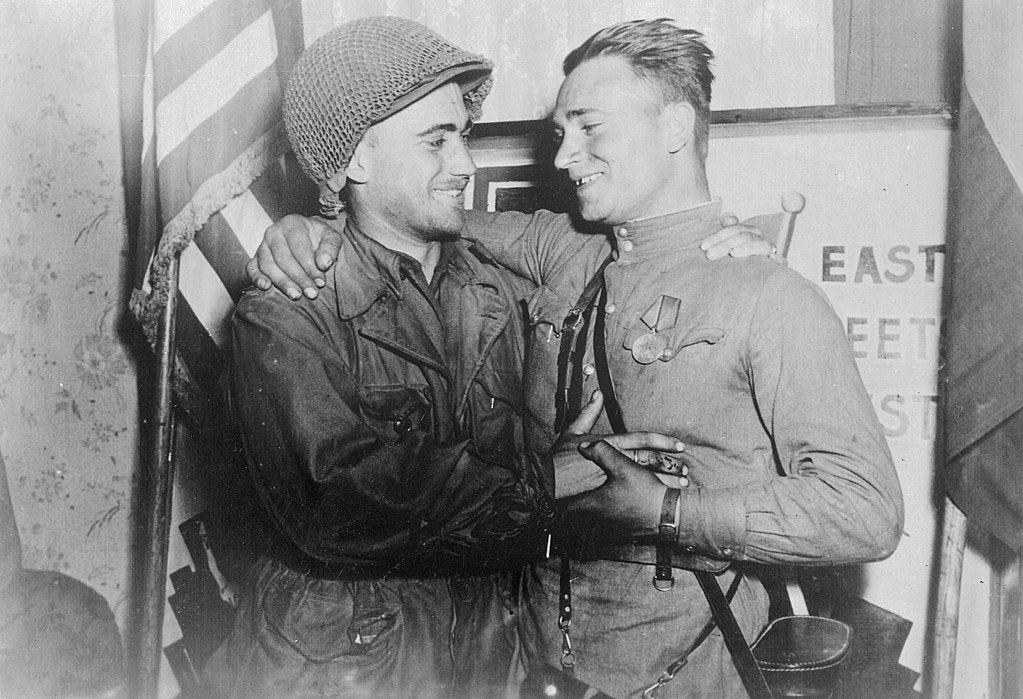
So its the end of the TL.





